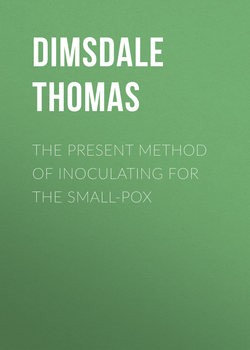Читать книгу The Present Method of Inoculating for the Small-Pox - Dimsdale Thomas - Страница 1
ОглавлениеINTRODUCTION
From the time that I entered into the practice of medicine, and saw the danger to which the generality of those who had the small-pox in the natural way were exposed, I could not but sincerely wish, with every sensible person of the faculty, that Inoculation might become general.
A considerable share of employment in this branch of my profession has for upwards of twenty years occurred to me; and altho’ I have been so fortunate as not to lose a patient under inoculation, except one child, about fourteen years ago, who after the eruption of a few distinct pustules died of a fever, which I esteemed wholly independent of the small-pox, yet I must acknowledge that in some cases the symptoms have cost me not a little anxiety for the event.
Nor have the subsequent effects of this practice always been so favourable as one could wish; and tho’ far from equalling those which too often follow the natural small-pox; either in respect to difficulty or number, yet they sometimes gave no small uneasiness to the operator.
It cannot likewise, it ought not to be concealed, that some of the inoculated have died under this process, even under the care of very able and experienced practitioners. But this number is so small, that, when compared with the mortality attending the natural small-pox, it is reduced almost to a cypher.
These circumstances, however, tended to discourage the operation in some degree. Practitioners were cautious of urging a process, of whose event they could not be certain: and parents, who were sensible enough to observe, that though the chance was greatly in their favour, yet a blank might cast up against them, engaged in it with hesitation.
Humanity, as well as a wish to promote the honour and advantage of the art I profess, made me ever attentive to the improvement of this part of my employment. Dissatisfied with the common methods, I had carefully attended to the circumstances that seemed to contribute to the good or ill success of this practice, in the course of my own business, as well as to the best information I could get of the success of others.
Many facts had induced me to think that regimen, preparation, and management would do much: that as the disease was of an inflammatory kind, a cooling regimen must certainly for the most part be reasonable. Some faint essays were made to try how far this sentiment might be just. But those who are the best acquainted with the first aphorism of Hippocrates, will be the first in justifying a cautious procedure, where the object is no less than the life of an individual.
In this situation I first heard, and with the utmost satisfaction, that in some parts of the nation, a new and more successful method of inoculating was discovered, than had hitherto been practised. The relators gave incredible accounts of the success; which was the more marvellous, as the operators were chiefly such, as, by report, could lay but little claim to medical erudition.
Knowing that improvements, which would do honour to the most elevated human understandings, are sometimes stumbled upon by men of more confined abilities; and that in medicine, as well as in every other circumstance in life, it is our duty to avail ourselves as much as possible of all discoveries tending to the common benefit, I embraced every just opportunity of informing myself of facts, circumstances, and events, that either public fame, or more precise relations, brought to me. I use the term just opportunity, because, if I am not misinformed, endeavours have been used, inconsistent with equity and candour, to rob those who are intitled to our gratitude for assisting us in this important process, of that share of private emolument which is their due, let their title to the discovery be ever so paradoxical.
To expose patients, even in the inoculated small-pox, to all weathers, was a thing unheard of. To permit them through the whole progress of the disease to go abroad, and follow their usual vocations, and that they should neither suffer any present evil, nor experience any disagreeable consequences, was still more surprizing; yet an infinite number of instances have confirmed all this; and some of these instances will appear in the sequel of this performance.
The design of this treatise is to bring the practice still one step nearer to perfection, and lessen the ravages of a distemper, which is not a native of Britain, but, like the plague, has been imported from a foreign country, and demands the exertion of all the powers we are possessed of, either to exterminate it from amongst us, which perhaps is not practicable, or to render it less unsafe, if not wholly without difficulty or danger.
The following directions for this purpose, are the result of an extensive practice: and if a strong persuasion of the truth of what he writes, founded on repeated trials and impartial observations, should have led the author to express himself in a very sanguine manner, the future experience of others, he trusts, will be his justification.
Hertford, 1. Nov.
1766.
